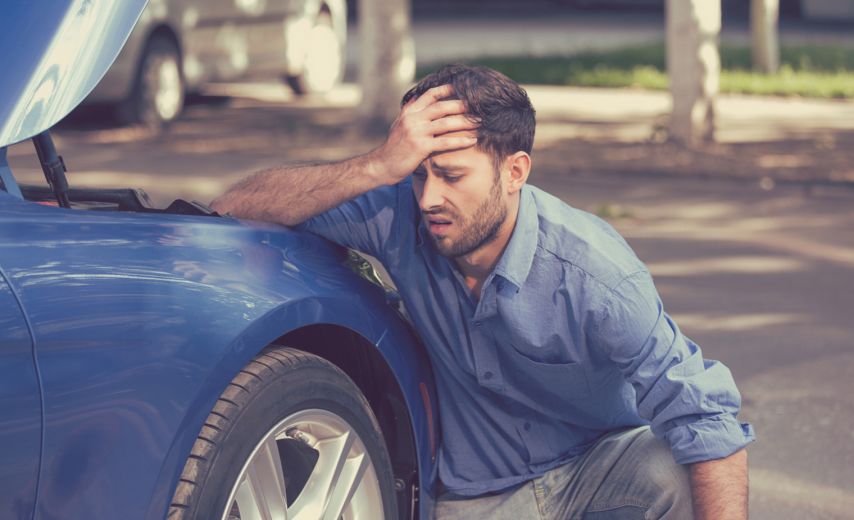If your car makes a grinding noise when accelerating, it could be due to issues like worn-out brake pads or a damaged CV joint. Addressing these problems promptly is crucial for your safety and preventing further damage to your vehicle.
Here’s what you need to know about the causes and fixes for a car that makes a grinding noise when accelerating.
Common Causes Of Grinding Noise
When your car makes a grinding noise while accelerating, it can be a cause for concern. Understanding the common causes of this issue can help you diagnose and fix the problem quickly. Here are three potential culprits:
Worn-out Brake Pads
One of the most common causes of a grinding noise when you accelerate is worn-out brake pads. Brake pads are responsible for pressing against the brake rotors to stop your car. Over time, these pads can wear down, resulting in a grinding sound. It’s essential to get your brake pads inspected regularly and replace them if necessary to prevent further damage to your braking system. Additionally, make sure to check if there are any foreign objects stuck between the brake pads and rotors, as debris can also cause a grinding noise.
Faulty Wheel Bearings
Another potential cause of grinding noise when accelerating is faulty wheel bearings. Wheel bearings allow your wheels to rotate smoothly. When these bearings wear out or become damaged, they can produce a grinding noise. If you notice the noise becoming more pronounced when you turn, it could indicate a problem with the wheel bearings. Timely inspection and replacement of faulty wheel bearings can prevent further damage to the wheels and ensure a safer driving experience.
Damaged Cv Joints
A third possible cause of grinding noise is damaged CV joints. CV joints are responsible for transferring power from the transmission to the wheels. When these joints become worn or damaged, they can generate a grinding sound. If you hear the noise when making tight turns, it may be an indication of CV joint issues. Ignoring the problem can lead to further damage to your car’s drivetrain, so it’s important to have damaged CV joints repaired or replaced promptly.

Credit: m.youtube.com
Signs And Symptoms
Signs and Symptoms:
If your car makes a grinding noise when accelerating, there are several signs and symptoms to watch out for. These indicators can help you identify the potential issues and tackle them early on, preventing further damage. From the grinding noise itself to vibrations and difficulty steering, paying attention to these signs can save you from costly repairs.
Grinding Noise
If you hear a grinding noise underneath the car when you accelerate, it could be a sign of worn-out wheel bearings, damaged driveshaft, or an issue with the transmission. Ignoring this grinding noise can lead to severe damage to these critical components, which is why immediate attention is essential.
Vibration
Vibration in the steering wheel, floorboard, or pedals along with the grinding noise indicates a potential problem with the drive axles or suspension components. This vibration can be a clear sign that your car needs a thorough inspection to pinpoint and fix the issue causing the unpleasant noise.
Difficulty Steering
Experiencing difficulty steering along with the grinding noise suggests a potential issue with the power steering system or steering rack. This can be a serious safety concern and requires immediate attention to prevent any hazardous driving situations.
Diagnosing The Issue
When your car makes a grinding noise while accelerating, it can be a cause for concern. This noise can indicate a variety of issues, ranging from minor to more serious problems. To identify the root cause of the grinding noise, it is essential to perform a proper diagnosis. In this section, we will discuss the steps involved in diagnosing the issue.
Visual Inspection
First, start with a visual inspection of the vehicle. Look for any visible signs of damage or loose components that could be causing the grinding noise. Check the undercarriage, engine compartment, and exhaust system for any signs of wear or damage. Pay close attention to the belts, pulleys, and hoses as these can often be the source of the grinding noise.
If you notice any loose or damaged parts during the visual inspection, it is important to address these issues promptly. Tightening loose components or replacing damaged parts can often resolve the grinding noise.
Road Test
The next step in diagnosing the issue is to take the car for a road test. Pay close attention to the specific conditions under which the grinding noise occurs. Is it more prominent during acceleration, deceleration, or while turning? Take note of the speed at which the noise is most noticeable.
During the road test, listen carefully to the noise and try to identify its location. Is it coming from the engine, transmission, wheels, or elsewhere? This information will help you narrow down the possible causes of the grinding noise.
Additionally, observe any other symptoms that may be present along with the grinding noise. Does the car vibrate or pull to one side? Is there a burning smell or a decrease in performance? These additional symptoms can provide valuable clues for diagnosing the issue.
Mechanic’s Diagnosis
If the visual inspection and road test do not provide a clear understanding of the grinding noise, it is recommended to consult a mechanic. A trained professional will have the knowledge and expertise to diagnose the issue accurately.
When taking your car to a mechanic, be sure to provide them with detailed information about the grinding noise, including when and where it occurs, as well as any additional symptoms. This will help the mechanic in their diagnosis and ensure that they address the root cause of the issue.
During the mechanic’s diagnosis, they may use specialized tools and equipment to further investigate the problem. This can include checking the fluid levels, conducting a computer diagnostic scan, or performing specific tests on the affected components.
Once the mechanic has identified the cause of the grinding noise, they will be able to recommend the appropriate fixes or repairs. It is crucial to follow their advice and address the issue promptly to prevent further damage to your car.

Credit: www.autotechiq.com
Fixes For Grinding Noise
Facing a grinding noise when you accelerate your car? Don’t ignore it as it could be a sign of an underlying issue that needs immediate attention. Fortunately, there are several fixes available for grinding noise in cars that can help resolve the problem. In this section, we will discuss three common fixes for grinding noise and how they can alleviate the issue.
Replacing Brake Pads
If your car makes a grinding noise when accelerating, worn-out brake pads could be the culprit. Over time, the brake pads become thin, causing the metal backing plates to rub against the rotors when you apply the brakes. This not only results in a grinding noise but can also lead to further damage if left unaddressed.
Replacing brake pads is a fairly straightforward task that can be done with basic tools. Here’s a step-by-step guide to help you:
1. Gather the necessary tools and materials:
- New brake pads
- Wrench or socket set
- Jack and jack stands
- C-clamp
- Brake cleaner
- Anti-squeal compound
2. Lift the car:
Use the jack to lift the car safely and secure it with jack stands. Ensure the car is on a level surface.
3. Remove the old brake pads:
Locate the caliper bolts and use the wrench or socket set to loosen and remove them. Slide the caliper off the rotor and gently pry the old brake pads out.
4. Install the new brake pads:
Apply a thin layer of anti-squeal compound to the back of the new brake pads. Insert them into the caliper and slide the caliper back onto the rotor. Tighten the caliper bolts back into place.
5. Repeat the process for the other side:
Repeat the above steps for the other side of the car to ensure both brake pads are replaced.
6. Test the brakes:
Once the new brake pads are installed, pump the brake pedal a few times to ensure they are properly seated. Then, take your car for a short test drive to verify that the grinding noise has been eliminated.
Repairing/replacing Wheel Bearings
Another potential cause of the grinding noise when accelerating is worn-out wheel bearings. These bearings allow the wheels to rotate smoothly and support the weight of the vehicle. Over time, they can become damaged or worn, resulting in a grinding or humming noise.
To repair or replace wheel bearings, it’s recommended to seek professional help as it requires specialized tools and knowledge. The process typically involves:
- Raising the car and securing it with jack stands for safety.
- Removing the wheel and brake assembly to access the wheel hub.
- Unbolting and removing the old wheel hub assembly.
- Installing the new wheel hub assembly.
- Reassembling the brake and wheel components.
Since wheel bearings play a crucial role in maintaining the stability and safety of your car, it’s important to address any grinding noise promptly and consult a professional to accurately diagnose and fix the issue.
Replacing Cv Joints
A worn-out or damaged CV joint can also be responsible for the grinding noise during acceleration. CV joints are part of the drive shaft assembly and allow the power to be transferred from the transmission to the wheels. When the CV joints start to wear out, they can produce a grinding or clicking noise.
Replacing CV joints typically involves:
- Removing the drive shaft from the vehicle.
- Unbolting the old CV joint and carefully separating it from the drive shaft.
- Installing the new CV joint onto the drive shaft.
- Reassembling the drive shaft and reinstalling it in the vehicle.
Replacing worn CV joints can help eliminate the grinding noise and ensure smooth power transfer to the wheels.
To sum up, if your car makes a grinding noise when accelerating, it’s crucial to identify and address the issue promptly. Replacing brake pads, repairing/replacing wheel bearings, or replacing CV joints are common fixes that can help resolve the problem. It’s recommended to consult a professional if you’re unsure about performing these fixes yourself to ensure proper diagnosis and resolution of the grinding noise.
Preventive Maintenance
Preventive maintenance is crucial in ensuring the smooth operation of your vehicle and preventing potential issues such as grinding noise during acceleration. Implementing regular maintenance practices can significantly extend the lifespan of your car’s essential components and enhance driving safety.
Regular Brake Inspections
Regular brake inspections are essential in detecting wear and tear on brake components, preventing potential grinding noise when accelerating. Brake pads, rotors, and calipers should be inspected for signs of damage or uneven wear. Proper maintenance of the brakes ensures efficient braking performance and eliminates the possibility of grinding noise, promoting a safer driving experience.
Proper Wheel Bearing Maintenance
Wheel bearing maintenance is crucial in preventing grinding noise when accelerating. Greasing wheel bearings, checking for signs of wear, and ensuring proper torque settings are necessary steps in maintaining wheel bearings. By employing proper maintenance practices, you can prevent potential issues such as noisy wheel bearings, ensuring smooth and quiet vehicle operation.
Cv Joint Maintenance
CV joint maintenance involves inspecting CV boots for cracks and tears, maintaining proper lubrication, and checking for signs of wear. By conducting regular maintenance on CV joints, you can prevent the onset of grinding noise during acceleration, ensuring the optimal performance and longevity of this critical drivetrain component.

Credit: www.rac.co.uk
Conclusion
If your car makes grinding noise when accelerating, it could be due to issues with the transmission, brakes, or other mechanical components. It’s important to address the problem promptly to avoid further damage. Regular maintenance and seeking professional help can ensure a smoother, quieter driving experience.
Keep your car running smoothly and enjoy the ride!


